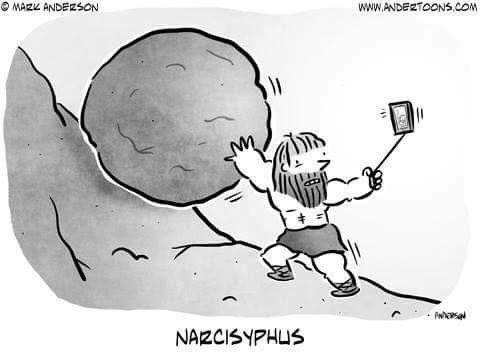The elephant in the room is, of course, the impending presidential defenestration. Responsible environmental administration is about to be tossed from the tower. A climate science denier will head EPA - or decapitate it. Drumpf's understanding of earth science, by analogy to golf links, would be laughable if it weren't so appalling
On the other hand, he's said he'll "look at" climate change. Our best hope for the new administration is that he'll see something threatening to his unblinded and unsequestered business interests and be moved by narrow self-regard to do some of the right things. Climate facts, and facts in general, may not motivate him, but dollar signs and his personal popularity always have.
He's said the bottom line is what addressing climate change will "cost our companies." It'll cost them their market, aka the planet. Surely even he can be made to see that, and to see the ignominy in being remembered to history as the inept politician whose short-sightedness cost us our last chance to preserve and protect the earth for acceptable human habitation.
Our better hope resides not in the Oval Office but with the rest of the world, and finally within each of us. Look to Berlin and Copenhagen, not Washington, for direction and hope. California won't be leaving the union any time soon, but will have every opportunity to lead it away from the precipice. "When the wind of change blows, some people build walls, others build windmills."
Naomi Klein told us that the climate crisis, bound up with crises of economics and of the human spirit, would "change everything" and usher in a hopeful new era. We just have to hope that happens soon. We've wondered what unexpected developments would trigger a widespread recognition that we'd reached a tipping point on climate. This election, maybe?
Tim Flannery gave us lots of cold hard climate facts, but then concluded with a warm hug of hope for the next generation's resourcefulness and resolve. Hope he's right too.
Chick Callenbach left us a hopeful vision of a better world, filling in a few details as to how we might reach it. But more importantly, he left us a letter. His epistle to the ecotopians, to us really, admits "decay" and urges us to embrace it as the paradoxical but prudent composted condition of hope. It's possible that a more enlightened leadership, by the winner of the popular vote, might have lulled us into compromised complacency. Now, that's no option. We're going to have to fight. Bring on the eco-war games.
We're well into this Anthropocene era of potentially catastrophic human impacts on the interdependent web of ecosystemic balance it's taken epochs to strike. Could it possibly be a good era, a good Anthropocene?
Andrew Revkin notes "the uniquely consequential nature of this moment," as we're blessed or cursed with an opportunity to change the game or lose it. Perhaps we are smack in the middle of a huge "transition from the lesser Anthropocene to the greater Anthropocene" and will be seen, in a century or so, as the Greatest Generation. That's hoping against hope.
Reflecting on all that has passed and is to come, I see the prospect of slow but substantial and productive shifts in the human enterprise. They will come along with a rich array of perceptions and responses among and within communities—from the scale of global society to that of the stratigraphic community.
Will this happen fast enough? Who knows. But this is the human way. A big part of engaging with the anthropocene, to my eye, is engaging with and even embracing ourselves as individuals and as a flawed and variegated yet amazing species. In 2003, biologists identified “response diversity” as a source of resilience in ecosystems. I’d assert that the same characteristic is an asset in societies as long as they work to level playing fields, foster education and transparency—and communicate.
Perhaps the last thing the world needs is another word. But in 2011, I offered a name for that kind of engagement. It might make you chuckle, given my earlier effort at naming something, but here goes. Anthropophilia.
Edward O. Wilson’s Biophilia was a powerful look outward at the characteristics of the natural world that we inherently cherish. Now we need a dose of what I’ve taken to calling anthropophilia as well. We have to accept ourselves, flaws and all, in order to move beyond what has been something of an unconscious, species-scale pubescent growth spurt enabled by fossil fuels in place of testosterone. In The World without Us, Alan Weisman created a haunting, best-selling, thought experiment—imagining a planet awakening after the vanishing of its human tormentor. The challenge: There is a real experiment well under way, and we’re all in the test tube.
We’re stuck with the story of The World with Us. It’s time to grasp that uncomfortable, but ultimately hopeful, idea.Is that a hopeful enough ending?
But as I always like to ask, rhetorically, when semesters end: what has concluded, that we may conclude? Be calm. Carry on. Get up each day and ask that morning question.
It's gonna be okay.
